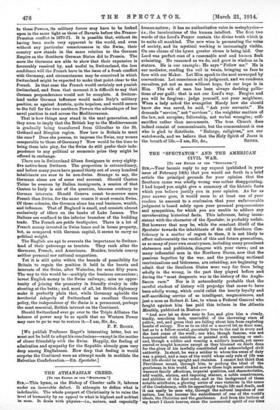THE ATHANASIAN CREED.
[To TIM EDITOR OP THE 4. SPECT■7011.1 nt.—This hymn, as the Bishop of Chester calls it, labours under an incurable defect. It attempts to define what is indefinable. The whole purport of Christianity is to raise the level of humanity by an appeal to what is highest and noblest in man. It deals with physics—i.e., nature, and especially human nature; it has no authoritative voice in metaphysics—. i.e., the luaubrations of the human intellect. The first two words of the Lord's Prayer contain the divine truth which is to unite all mankind. The new wine is permeating the veins of society, and its mystical working is increasingly visible. On one clause of the hymn greater stress is being laid. Our Lord was perfect man of a reasonable soul and human flesh subsisting. He reasoned, as we do, and grew in wisdom as in stature. He is our example : He says "Follow me." He is our mediator, rending the veil in twain, bringing us face to face with our Maker. Let Him speak to the soul unwarped by conventions. Let conscience sit in judgment, and we condemn ourselves, yet not as men without hope, for our hope is in Him. The wit of man has been always devising pallia- tions of our guilt: that is not our Lord's way. Forgive and you will be forgiven: judge yourself, not your neighbour. When a lady asked the evangelist Moody how she should know she was saved, he said, "Ask your servants." He demands "service," not "services"; the weightier matters of the law, not scruples; fellowship, not verbal wrangles ; self- sacrifice rather than sacraments. The true Church does indeed consist of communicants, but the communicant is one who is glad to distribute. "Enlarge, enlighten," are our watchwords, and we believe that the Holy Spirit of Jeans is
the breath of life.—I am, Sir, Sm., SENEX.










































 Previous page
Previous page